018quiztestnurse
Greetings! in this page you will get acces with education resources practice questions with answers and study materials modified to empower and enhance your knowledge, I will be sharing all materials, study guides, tests, Q&As, test banks, Hesi questions, etc. on my page for . Best of luck to you all! Happy studying!
- 478
- 0
- 2
Community
- Followers
- Following
480 items
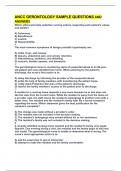
ANCC GERONTOLOGY SAMPLE QUESTIONS AND ANSWERS
ANCC GERONTOLOGY SAMPLE QUESTIONS AND ANSWERS Which ethical principle underlies nursing actions respecting each patient's values and beliefs? A) Autonomy. B) Beneficence. C) Justice. D) Responsibility. A The most common symptoms of benign prostatic hypertrophy are: A) chills, fever, and nausea. B) dysuria, abdominal pain, and urinary retention. C) intermittency, hesitancy, and dribbling. D) nocturia, bladder spasms, and hematuria. C The gerontological nurse is monitoring signs ...
- Exam (elaborations)
- • 6 pages •
ANCC GERONTOLOGY SAMPLE QUESTIONS AND ANSWERS Which ethical principle underlies nursing actions respecting each patient's values and beliefs? A) Autonomy. B) Beneficence. C) Justice. D) Responsibility. A The most common symptoms of benign prostatic hypertrophy are: A) chills, fever, and nausea. B) dysuria, abdominal pain, and urinary retention. C) intermittency, hesitancy, and dribbling. D) nocturia, bladder spasms, and hematuria. C The gerontological nurse is monitoring signs ...
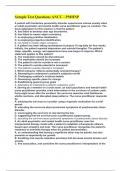
Sample Test Questions ANCC - PMHNP
Sample Test Questions ANCC - PMHNP A patient with borderline personality disorder experiences intense anxiety when an adult psychiatric and mental health nurse practitioner goes on vacation. The best explanation for this reaction is that the patient: A. has failed to develop clear ego boundaries. B. has failed to master object constancy. C. is employing primitive idealization. D. is employing projective identification. B. has failed to master object constancy 2. A patient has been takin...
- Exam (elaborations)
- • 6 pages •
Sample Test Questions ANCC - PMHNP A patient with borderline personality disorder experiences intense anxiety when an adult psychiatric and mental health nurse practitioner goes on vacation. The best explanation for this reaction is that the patient: A. has failed to develop clear ego boundaries. B. has failed to master object constancy. C. is employing primitive idealization. D. is employing projective identification. B. has failed to master object constancy 2. A patient has been takin...
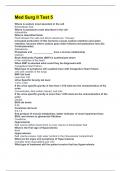
Med Surg II Test 5
Med Surg II Test 5 Where is sodium most abundant in the cell Extracellular fluid Where is potassium most abundant in the cell Intracellular What is Interstitial fluids Fluid between the cells and blood vessels (ex. Tissues) Increased production of this hormone causes sodium retention (and water retention, because where sodium goes water follows) and potassium loss (Ex. Corticosteroids) Aldosterone Phosphate and _______________ have a inverse relationship Calcium Brain Natriuretic Pe...
- Exam (elaborations)
- • 8 pages •
Med Surg II Test 5 Where is sodium most abundant in the cell Extracellular fluid Where is potassium most abundant in the cell Intracellular What is Interstitial fluids Fluid between the cells and blood vessels (ex. Tissues) Increased production of this hormone causes sodium retention (and water retention, because where sodium goes water follows) and potassium loss (Ex. Corticosteroids) Aldosterone Phosphate and _______________ have a inverse relationship Calcium Brain Natriuretic Pe...
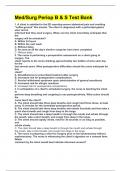
Med/Surg Periop B & S Test Bank
Med/Surg Periop B & S Test Bank 1. A client is admitted to the ED reporting severe abdominal pain and vomiting "coffee-ground" like emesis. The client is diagnosed with a perforated gastric ulcer and is informed that they need surgery. When can the client most likely anticipate that the surgery will be scheduled? A. Within 24 hours B. Within the next week C. Without delay D. As soon as all the day's elective surgeries have been completed C. Without delay 2. The nurse is performing...
- Exam (elaborations)
- • 27 pages •
Med/Surg Periop B & S Test Bank 1. A client is admitted to the ED reporting severe abdominal pain and vomiting "coffee-ground" like emesis. The client is diagnosed with a perforated gastric ulcer and is informed that they need surgery. When can the client most likely anticipate that the surgery will be scheduled? A. Within 24 hours B. Within the next week C. Without delay D. As soon as all the day's elective surgeries have been completed C. Without delay 2. The nurse is performing...
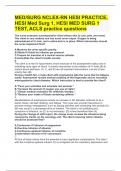
MED/SURG NCLEX-RN HESI PRACTICE, HESI Med Surg 1, HESI MED SURG 1 TEST, ACLS practice questions
MED/SURG NCLEX-RN HESI PRACTICE, HESI Med Surg 1, HESI MED SURG 1 TEST, ACLS practice questions The nurse assesses a postoperative client whose skin is cool, pale, and moist. The client is very restless and has scant urine output. Oxygen is being administered at 2 L/min, and a saline lock is in place. Which intervention should the nurse implement first? A.Measure the urine specific gravity. B.Obtain IV fluids for infusion per protocol. C.Prepare for insertion of a central venous catheter...
- Exam (elaborations)
- • 83 pages •
MED/SURG NCLEX-RN HESI PRACTICE, HESI Med Surg 1, HESI MED SURG 1 TEST, ACLS practice questions The nurse assesses a postoperative client whose skin is cool, pale, and moist. The client is very restless and has scant urine output. Oxygen is being administered at 2 L/min, and a saline lock is in place. Which intervention should the nurse implement first? A.Measure the urine specific gravity. B.Obtain IV fluids for infusion per protocol. C.Prepare for insertion of a central venous catheter...
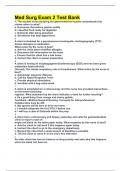
Med Surg Exam 2 Test Bank
Med Surg Exam 2 Test Bank 1. The student nurse studying the gastrointestinal system understands that chyme refers to what? a. Hormones that reduce gastric acidity b. Liquefied food ready for digestion c. Nutrients after being absorbed d. Secretions that help digest food b A client scheduled for a percutaneous transhepatic cholangiography (PTC) denies allergies to medication. What action by the nurse is best? a. Ask the client about shellfish allergies. b. Document this information on t...
- Exam (elaborations)
- • 37 pages •
Med Surg Exam 2 Test Bank 1. The student nurse studying the gastrointestinal system understands that chyme refers to what? a. Hormones that reduce gastric acidity b. Liquefied food ready for digestion c. Nutrients after being absorbed d. Secretions that help digest food b A client scheduled for a percutaneous transhepatic cholangiography (PTC) denies allergies to medication. What action by the nurse is best? a. Ask the client about shellfish allergies. b. Document this information on t...
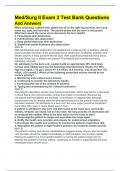
Med/Surg II Exam 3 Test Bank Questions And Answers
Med/Surg II Exam 3 Test Bank Questions And Answers When assessing a patient who spilled hot oil on the right leg and foot, the nurse notes dry, pale, and hard skin. The patient states that the burn is not painful. What term would the nurse use to document the burn depth? a. First-degree skin destruction b. Full-thickness skin destruction c. Deep partial-thickness skin destruction d. Superficial partial-thickness skin destruction ANS: B With full-thickness skin destruction, the appearance ...
- Exam (elaborations)
- • 30 pages •
Med/Surg II Exam 3 Test Bank Questions And Answers When assessing a patient who spilled hot oil on the right leg and foot, the nurse notes dry, pale, and hard skin. The patient states that the burn is not painful. What term would the nurse use to document the burn depth? a. First-degree skin destruction b. Full-thickness skin destruction c. Deep partial-thickness skin destruction d. Superficial partial-thickness skin destruction ANS: B With full-thickness skin destruction, the appearance ...
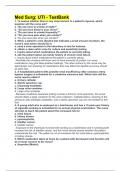
Med Surg: UTI - TestBank
Med Surg: UTI - TestBank 1. To assess whether there is any improvement in a patient's dysuria, which question will the nurse ask? a. "Do you have to urinate at night?" b. "Do you have blood in your urine?" c. "Do you have to urinate frequently?" d. "Do you have pain when you urinate?" d. "Do you have pain when you urinate?" 2. When a patient's urine dipstick test indicates a small amount of protein, the nurse's next action should be to a. send a urine specimen to the laborat...
- Exam (elaborations)
- • 11 pages •
Med Surg: UTI - TestBank 1. To assess whether there is any improvement in a patient's dysuria, which question will the nurse ask? a. "Do you have to urinate at night?" b. "Do you have blood in your urine?" c. "Do you have to urinate frequently?" d. "Do you have pain when you urinate?" d. "Do you have pain when you urinate?" 2. When a patient's urine dipstick test indicates a small amount of protein, the nurse's next action should be to a. send a urine specimen to the laborat...
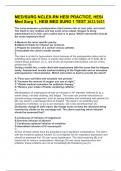
MED/SURG NCLEX-RN HESI PRACTICE, HESI Med Surg 1, HESI MED SURG 1 TEST 2022/2023
MED/SURG NCLEX-RN HESI PRACTICE, HESI Med Surg 1, HESI MED SURG 1 TEST 2022/2023 The nurse assesses a postoperative client whose skin is cool, pale, and moist. The client is very restless and has scant urine output. Oxygen is being administered at 2 L/min, and a saline lock is in place. Which intervention should the nurse implement first? A.Measure the urine specific gravity. B.Obtain IV fluids for infusion per protocol. C.Prepare for insertion of a central venous catheter. D.Auscultat...
- Exam (elaborations)
- • 68 pages •
MED/SURG NCLEX-RN HESI PRACTICE, HESI Med Surg 1, HESI MED SURG 1 TEST 2022/2023 The nurse assesses a postoperative client whose skin is cool, pale, and moist. The client is very restless and has scant urine output. Oxygen is being administered at 2 L/min, and a saline lock is in place. Which intervention should the nurse implement first? A.Measure the urine specific gravity. B.Obtain IV fluids for infusion per protocol. C.Prepare for insertion of a central venous catheter. D.Auscultat...
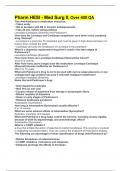
Pharm HESI - Med Surg II, Over 400 QA
Pharm HESI - Med Surg II, Over 400 QA This Anti-Parkinson's medication should be: • Taken orally • Not to be taken with B6 or tricyclic antidepressants • Take 30 min. before eating proteins Levodopa-Carbidopa (Sinemet) Anti-Parkinson's How does the Levidopa and Carbidopa compliment each other in the combined drug, Sinemet? • Levodopa is a precursor for dopamine and must be given in high doses because it is broken down outside the CNS • Carbidopa prevents the breakdown of Levo...
- Exam (elaborations)
- • 40 pages •
Pharm HESI - Med Surg II, Over 400 QA This Anti-Parkinson's medication should be: • Taken orally • Not to be taken with B6 or tricyclic antidepressants • Take 30 min. before eating proteins Levodopa-Carbidopa (Sinemet) Anti-Parkinson's How does the Levidopa and Carbidopa compliment each other in the combined drug, Sinemet? • Levodopa is a precursor for dopamine and must be given in high doses because it is broken down outside the CNS • Carbidopa prevents the breakdown of Levo...
